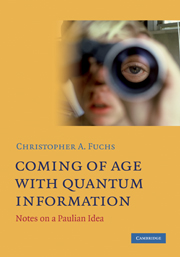Book contents
- Frontmatter
- Contents
- Foreword
- Introduction to the Cambridge University Press Edition
- Introduction to the Original ArXiv.org Posting
- Disclaimers
- Acknowledgements
- 1 Letters to David Baker
- 2 Letters to Howard Baker
- 3 Letters to Howard Barnum
- 4 Letters to Paul Benioff
- 5 Letters to Charlie Bennett
- 6 Letters to Herb Bernstein
- 7 Letters to Doug Bilodeau
- 8 Letters to Gilles Brassard
- 9 Letters to Jeffrey Bub
- 10 Letters to Carlton Caves
- 11 Letters to Greg Comer
- 12 Letters to Charles Enz
- 13 Letters to Henry Folse
- 14 Letters to Bob Griffiths
- 15 Letters to Adrian Kent
- 16 Letters to Rolf Landauer
- 17 Letters to Hideo Mabuchi
- 18 Letters to David Mermin
- 19 Letters to David Meyer
- 20 Letters to Jeff Nicholson
- 21 Letters to Michael Nielsen
- 22 Letters to Asher Peres
- 23 Diary of a Carefully Worded Paper: More Letters to Asher Peres
- 24 Letters to John Preskill
- 25 Letters to Joseph Renes
- 26 Letters to Mary Beth Ruskai
- 27 Letters to Rüdiger Schack
- 28 Letters to Robert Schumann
- 29 Letters to Abner Shimony
- 30 Letters to Jon Waskan
- 31 Letters to Bill Wootters
- 32 Letters to Anton Zeilinger
- 33 Other Letters
- Postpartum
- Index of Names
16 - Letters to Rolf Landauer
Published online by Cambridge University Press: 05 October 2012
- Frontmatter
- Contents
- Foreword
- Introduction to the Cambridge University Press Edition
- Introduction to the Original ArXiv.org Posting
- Disclaimers
- Acknowledgements
- 1 Letters to David Baker
- 2 Letters to Howard Baker
- 3 Letters to Howard Barnum
- 4 Letters to Paul Benioff
- 5 Letters to Charlie Bennett
- 6 Letters to Herb Bernstein
- 7 Letters to Doug Bilodeau
- 8 Letters to Gilles Brassard
- 9 Letters to Jeffrey Bub
- 10 Letters to Carlton Caves
- 11 Letters to Greg Comer
- 12 Letters to Charles Enz
- 13 Letters to Henry Folse
- 14 Letters to Bob Griffiths
- 15 Letters to Adrian Kent
- 16 Letters to Rolf Landauer
- 17 Letters to Hideo Mabuchi
- 18 Letters to David Mermin
- 19 Letters to David Meyer
- 20 Letters to Jeff Nicholson
- 21 Letters to Michael Nielsen
- 22 Letters to Asher Peres
- 23 Diary of a Carefully Worded Paper: More Letters to Asher Peres
- 24 Letters to John Preskill
- 25 Letters to Joseph Renes
- 26 Letters to Mary Beth Ruskai
- 27 Letters to Rüdiger Schack
- 28 Letters to Robert Schumann
- 29 Letters to Abner Shimony
- 30 Letters to Jon Waskan
- 31 Letters to Bill Wootters
- 32 Letters to Anton Zeilinger
- 33 Other Letters
- Postpartum
- Index of Names
Summary
February 1998, “Law Without Law…Or Something Like That”
This morning I read one of the papers you gave me last week (“Information is Inevitably Physical”) and was reminded of your interest in the idea that the laws of physics may not be written in stone once and for all…but instead may be contingent upon the particular details of the universe itself…and indeed may be evolutionary à la Peirce, Wheeler, Lee Smolin, etc. At least one version or other of this kind of thing has intrigued me for some time (essentially since meeting John Wheeler in 1985). It's been sort of a hidden hobby, somewhat connected with separating the wheat from the chaff in quantum mechanics. My personal writings on the subject are now pretty voluminous, though not yet tight enough in substance that I show them to too many: most are in the form of emails to colleagues such as you.
Anyway, if you're interested, perhaps I'll compile a small compendium and send it your way when I get back from Tokyo March 15 – I'm travelling essentially every moment until then. May be this will help us open a dialog to pinpoint where some real progress might be made.
In the meantime let me tip you off to another article on the subject that I ran across recently: S. S. Schweber: “The Metaphysics of Science at the End of a Heroic Age,” in Experimental Metaphysics, edited by R. S. Cohen, M. Horne, and J. Stachel (Kluwer, Dordrecht, 1997), pp. 171–198.
- Type
- Chapter
- Information
- Coming of Age With Quantum InformationNotes on a Paulian Idea, pp. 210 - 214Publisher: Cambridge University PressPrint publication year: 2011



